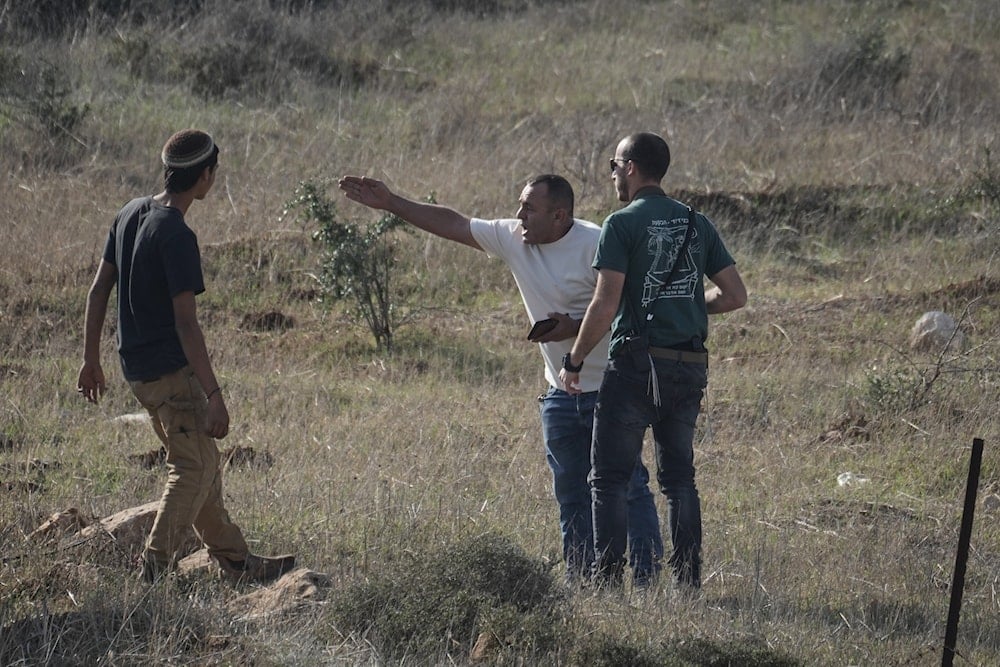E4 nations condemn surge in Israeli settler attacks in West Bank
France, Germany, Italy, and the UK condemn the rise in West Bank settler violence and urge "Israel" to comply with international law.
-

A Palestinian resident of the West Bank village of Tarkumiya argues with Israeli settlers during a protest against a land seizure in the area, Friday, Nov. 28, 2025 (AP)
France, Germany, Italy, and the United Kingdom on Thursday called on "Israel" to comply with international law and take immediate measures to protect Palestinians in the occupied West Bank, as illegal settler attacks surged to levels not seen in nearly two decades, Anadolu reported.
In a joint statement, the four countries, collectively known as the E4, condemned the sharp rise in settler violence against Palestinian civilians and urged stability in the West Bank. Citing United Nations figures, the statement noted that 264 settler attacks were recorded in October alone, marking the highest monthly total since systematic monitoring began in 2006.
The E4 foreign ministers expressed deep concern over the escalation, warning that the violence is destabilizing the region and increasing the risk of broader tensions. They called on the Israeli government to uphold its obligations under international law, ensure accountability for perpetrators, and address the root causes of the attacks.
The statement also reiterated the four governments’ longstanding opposition to any form of "annexation" or settlement policies violating international law and reaffirmed their commitment to a negotiated "two-state solution".
“These attacks must stop,” the ministers said, emphasizing that such violence instills terror among civilians, undermines peace efforts, and ultimately threatens the long-term security of "Israel" itself.
32,000 Palestinians displaced by Israeli assault on West Bank camps
More than 32,000 Palestinians have been displaced by an ongoing Israeli offensive in refugee camps across the northern West Bank, the UN agency for Palestinian refugees (UNRWA) reported Thursday, Anadolu said.
Rolan Friedrich, Director of UNRWA Affairs for the West Bank, stated that the Israeli assault emptied the Jenin, Tulkarm, and Nur Shams refugee camps, displacing thousands of residents. “And yet, even in these ghost towns that were once vibrant camps, Israeli forces still see the need to order demolitions for the sake of so-called ‘military purposes,’” he added.
According to Friedrich, Israeli authorities issued two mass demolition orders affecting over 190 buildings in the Jenin refugee camp, with an additional 12 buildings slated for demolition in the coming days. He described these actions as “the newest episode in continued efforts to re-engineer the topography of refugee camps in the northern West Bank.”
Friedrich further warned that the systematic destruction violates basic principles of international law and effectively expands Israeli military control over the refugee camps. He called for immediate efforts to rebuild the camps and allow displaced residents to return, stating, “They must not be trapped in interminable displacement.”
The Israeli military began a large-scale operation in the Jenin refugee camp on January 21, which subsequently extended to the Tulkarem and Nur Shams camps as well as other parts of the northern West Bank.
Israeli army, settlers, mercilessly assault West Bank
Alongside the ongoing two-year war in Gaza, which has resulted in nearly 70,000 deaths, attacks by the Israeli occupation forces and illegal settlers in the West Bank have killed at least 1,083 Palestinians, injured around 11,000, and led to the detention of more than 20,500, according to official Palestinian figures
In recent days, the occupied West Bank has seen a fresh wave of violence as Israeli occupation forces (IOF) and settlers intensified raids, arrests, and assaults across several towns.
On November 27, 2025, IOF stormed villages including Deir Jarir and Deir Dibwan east of Ramallah, while confrontations erupted in nearby Silwad when Palestinian youths resisted the combined presence of settlers and military forces. The raids extended to Nablus, where IOF raided the New Askar refugee camp and detained several residents, as well as the town of Tubas and surrounding areas, marking a broad escalation of military operations across the northern West Bank.
In the early hours of November 13, settlers set fire to and defaced the Hajjeh Hamideh Mosque, located between the towns of Deir Istiya and Kifl Haris near Salfit, spraying racist slogans on its walls and burning Qurans, an act that drew condemnation for its symbolic and community‑level impact.
Meanwhile, on November 11 and 12, 2025, masked settlers carried out coordinated attacks targeting Palestinian property and agricultural facilities. In the town of Beit Lid, near Tulkarm, settlers stormed the gates of the al‑Juneidi dairy company, torched several of its trucks, and set fire to parts of the facility, while in surrounding farmland and Bedouin‑tent areas, more property destruction and stone‑throwing occurred.
These incidents build on a broader trend: according to local reports summarizing UN and humanitarian‑agency data, some 2,300 attacks by settlers and Israeli forces were recorded in the West Bank during October 2025 alone. The violence, which includes raids, property destruction, arson, and assaults, has especially targeted agricultural lands, olive groves, and Palestinian livelihoods during a critical harvest season.

 5 Min Read
5 Min Read








